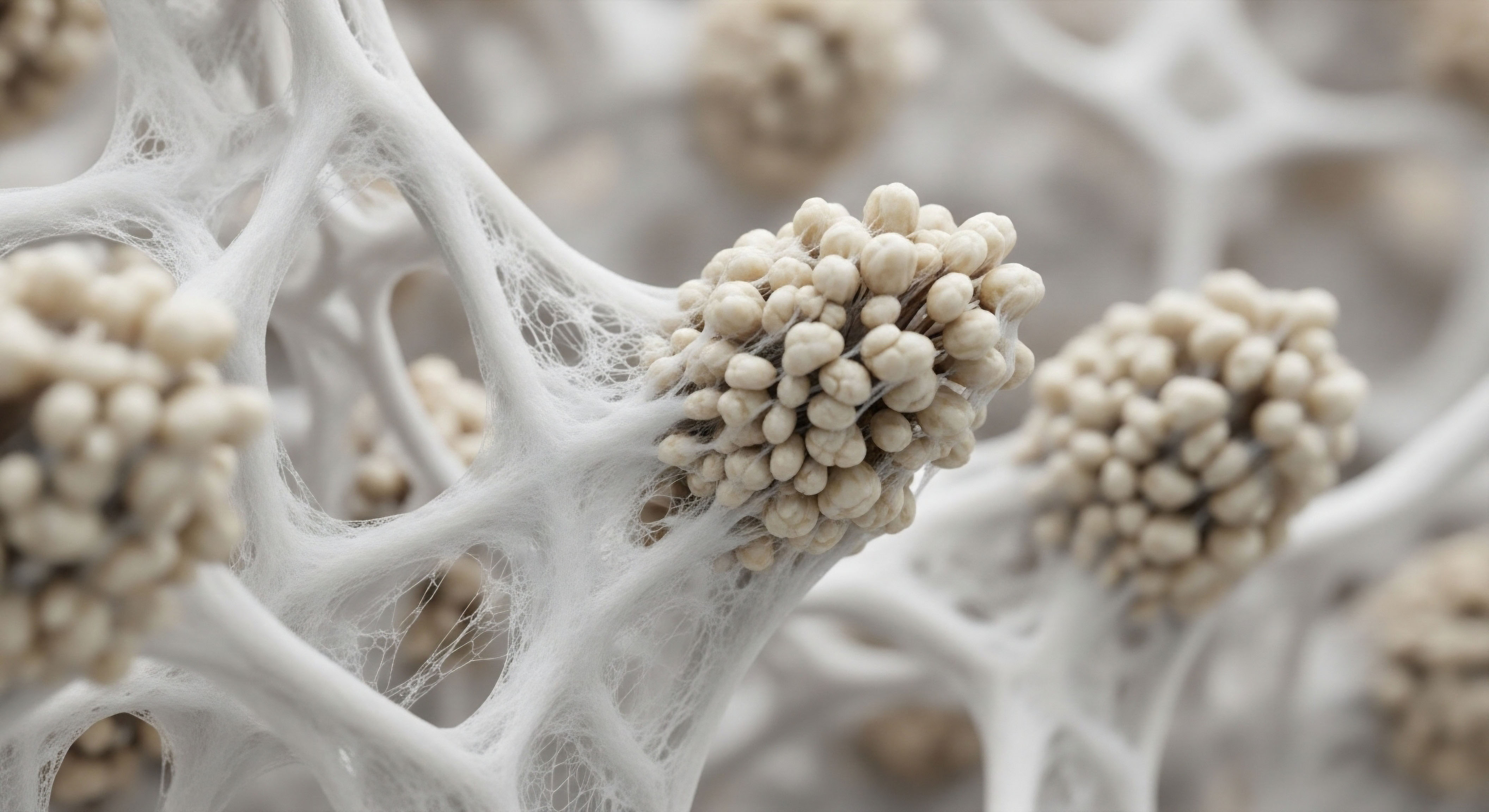

Fundamentals
Perhaps you have noticed a subtle shift in your cognitive landscape, a slight hesitation in recall, or a diminished mental clarity that was once second nature. This experience, often dismissed as an inevitable part of growing older, can be disorienting. It prompts a deeper inquiry into the biological systems that govern our vitality.
Understanding these changes requires looking beyond surface-level observations, delving into the intricate communication networks within your body. Our personal journey toward optimal well-being begins with recognizing that such shifts are not merely signs of time passing; they are often signals from our endocrine system, indicating a need for recalibration.
The endocrine system functions as the body’s internal messaging service, utilizing hormones as its primary communicators. These biochemical signals travel throughout the bloodstream, influencing nearly every cell, tissue, and organ. Among these vital messengers, testosterone holds a significant, yet often misunderstood, position.
While commonly associated with reproductive health and muscle mass, its influence extends far beyond these familiar roles, reaching into the very architecture and function of the brain. The brain, a complex organ, relies on a precise balance of these hormonal signals to maintain its structural integrity and operational efficiency. As we age, the production of various hormones, including testosterone, can naturally decline, potentially impacting cognitive abilities and overall neurological resilience.
Consider the brain’s remarkable capacity for adaptation and learning, a capacity sustained by healthy neuronal connections and cellular regeneration. This intricate biological machinery is highly sensitive to its internal environment. When hormonal balance is disrupted, even subtly, the brain’s ability to perform at its peak can be compromised.
Symptoms such as reduced mental acuity, difficulty concentrating, or even changes in mood can often be traced back to these underlying biochemical shifts. Our aim is to provide clarity on these connections, translating complex clinical science into knowledge that empowers you to reclaim your cognitive sharpness and overall vitality.
The brain’s optimal function relies on balanced hormonal signals, and understanding these biochemical connections is key to addressing age-related cognitive shifts.

How Do Hormones Influence Brain Function?
Hormones exert their influence on brain function through various mechanisms, acting as modulators of neuronal activity and cellular health. The brain contains a wide distribution of specific receptors for these hormones, including androgen receptors (ARs), which bind testosterone and its metabolites.
These receptors are present in critical brain regions associated with memory, learning, and mood regulation, such as the hippocampus, prefrontal cortex, and amygdala. When testosterone levels are optimal, these receptors facilitate a cascade of cellular events that support neurological well-being.
One primary mechanism involves the regulation of neurotransmitters, the chemical messengers that transmit signals between neurons. Testosterone can influence the synthesis, release, and reuptake of neurotransmitters like dopamine, serotonin, and acetylcholine, all of which are essential for cognitive processes, mood stability, and overall brain health. A balanced neurotransmitter profile supports clear thinking, emotional regulation, and efficient information processing.
Another significant aspect of hormonal influence is neuroprotection. Testosterone has demonstrated properties that shield brain cells from damage caused by oxidative stress and inflammation. Oxidative stress, a process involving an imbalance between free radicals and antioxidants, can harm cellular components, including neurons. Inflammation, while a natural immune response, can become detrimental when chronic, contributing to neurodegenerative processes. By mitigating these harmful factors, testosterone helps preserve neuronal integrity and function.
The concept of the Hypothalamic-Pituitary-Gonadal (HPG) axis serves as a central organizing principle for understanding hormonal regulation. This axis represents a sophisticated feedback loop involving the hypothalamus in the brain, the pituitary gland, and the gonads (testes in men, ovaries in women).
The hypothalamus releases gonadotropin-releasing hormone (GnRH), which signals the pituitary to produce luteinizing hormone (LH) and follicle-stimulating hormone (FSH). These gonadotropins then stimulate the gonads to produce testosterone and other sex hormones. This intricate system ensures that hormone levels are tightly controlled, responding to the body’s needs. Disruptions within this axis can lead to hormonal imbalances that affect not only reproductive function but also broader systemic health, including cognitive performance.


Intermediate
When considering interventions for optimizing hormonal health, particularly as it relates to cognitive function, a precise and individualized approach becomes paramount. Testosterone therapy, often referred to as hormonal optimization protocols, is not a one-size-fits-all solution. It involves a careful assessment of an individual’s unique biochemical profile, symptoms, and health objectives. The goal is to restore physiological balance, supporting the body’s inherent capacity for self-regulation and repair.

Testosterone Replacement Therapy for Men
For men experiencing symptoms associated with declining testosterone levels, often termed andropause or late-onset hypogonadism, Testosterone Replacement Therapy (TRT) can be a transformative intervention. The standard protocol frequently involves weekly intramuscular injections of Testosterone Cypionate, typically at a concentration of 200mg/ml. This method ensures consistent delivery of the hormone, avoiding the peaks and troughs associated with less frequent administration.
A comprehensive male hormone optimization protocol extends beyond merely administering testosterone. It often includes adjunctive medications to manage potential side effects and support endogenous hormone production.
- Gonadorelin ∞ Administered via subcutaneous injections, typically twice weekly, this peptide helps maintain the body’s natural testosterone production and preserves fertility by stimulating the pituitary gland to release LH and FSH. This approach helps prevent testicular atrophy, a common concern with exogenous testosterone administration.
- Anastrozole ∞ This oral tablet, taken twice weekly, functions as an aromatase inhibitor. Its purpose is to block the conversion of testosterone into estrogen, thereby mitigating potential estrogen-related side effects such as gynecomastia or water retention. Maintaining an optimal testosterone-to-estrogen ratio is vital for overall well-being and cognitive health.
- Enclomiphene ∞ In some cases, Enclomiphene may be incorporated into the protocol. This medication selectively modulates estrogen receptors, encouraging the pituitary to produce more LH and FSH, which in turn stimulates the testes to produce more testosterone. This can be particularly useful for men seeking to boost natural production or as part of a fertility-stimulating protocol.
The precise dosage and combination of these agents are meticulously tailored based on regular blood tests, symptom resolution, and individual response. This personalized approach ensures that the therapy is both effective and safe, supporting not only physical vitality but also cognitive function and mood stability.

Testosterone Replacement Therapy for Women
Women, particularly those navigating peri-menopause and post-menopause, can also experience significant benefits from carefully calibrated testosterone therapy. Symptoms such as irregular cycles, mood fluctuations, hot flashes, and diminished libido often signal hormonal shifts that extend beyond estrogen and progesterone. Testosterone, though present in smaller quantities in women, plays a vital role in their overall health, including cognitive sharpness and emotional balance.
Protocols for women are distinct from those for men, emphasizing lower doses to achieve physiological levels without inducing masculinizing side effects.
- Testosterone Cypionate ∞ Typically administered weekly via subcutaneous injection, the dosage is significantly lower than for men, often ranging from 10 ∞ 20 units (0.1 ∞ 0.2ml). This micro-dosing approach aims to restore testosterone to the upper end of the normal female physiological range, supporting energy, mood, and cognitive function.
- Progesterone ∞ This hormone is prescribed based on menopausal status and individual needs. Progesterone plays a crucial role in balancing estrogen, supporting sleep, and influencing mood. Its inclusion helps create a more comprehensive hormonal balance.
- Pellet Therapy ∞ For some women, long-acting testosterone pellets offer a convenient alternative. These small pellets are inserted subcutaneously, providing a steady release of testosterone over several months. Anastrozole may be co-administered with pellet therapy when appropriate, particularly if there is a concern about excessive estrogen conversion.
This careful titration of hormones aims to alleviate symptoms, enhance quality of life, and support neurological health, recognizing the unique endocrine needs of women across different life stages.
Personalized testosterone therapy for men and women involves precise dosing and adjunctive medications to restore hormonal balance, supporting physical and cognitive well-being.

Post-TRT or Fertility-Stimulating Protocol for Men
For men who have discontinued TRT or are actively trying to conceive, a specialized protocol is implemented to restore natural testicular function and optimize fertility. This involves a combination of medications designed to stimulate the HPG axis.
- Gonadorelin ∞ Continued or initiated to stimulate the pituitary, promoting LH and FSH release.
- Tamoxifen ∞ A selective estrogen receptor modulator (SERM) that blocks estrogen’s negative feedback on the pituitary, thereby increasing LH and FSH secretion.
- Clomid (Clomiphene Citrate) ∞ Another SERM that works similarly to Tamoxifen, stimulating gonadotropin release and, consequently, endogenous testosterone production and spermatogenesis.
- Anastrozole ∞ Optionally included to manage estrogen levels, especially if there is a concern about high estrogen impacting fertility or causing side effects during the recovery phase.
This protocol helps men transition off exogenous testosterone while supporting their body’s inherent ability to produce hormones and maintain reproductive capacity.

Growth Hormone Peptide Therapy and Other Targeted Peptides
Beyond direct testosterone modulation, other biochemical recalibration strategies significantly influence overall well-being, including cognitive vitality. Growth Hormone Peptide Therapy represents a sophisticated approach for active adults and athletes seeking anti-aging benefits, muscle gain, fat loss, and improved sleep quality. These peptides stimulate the body’s natural production of growth hormone, avoiding the direct administration of synthetic HGH.
Key peptides in this category include ∞
- Sermorelin ∞ A growth hormone-releasing hormone (GHRH) analog that stimulates the pituitary to release growth hormone.
- Ipamorelin / CJC-1295 ∞ A combination often used together. Ipamorelin is a growth hormone secretagogue, and CJC-1295 is a GHRH analog. Their combined action provides a sustained, pulsatile release of growth hormone, mimicking the body’s natural rhythm. This combination is particularly noted for improving sleep quality, which has direct benefits for cognitive restoration and memory consolidation.
- Tesamorelin ∞ A GHRH analog approved for reducing visceral fat, it also shows promise in improving cognitive function, particularly in individuals with cognitive impairment.
- Hexarelin ∞ Another growth hormone secretagogue, known for its potent growth hormone-releasing effects.
- MK-677 (Ibutamoren) ∞ An oral growth hormone secretagogue that increases growth hormone and IGF-1 levels.
These peptides contribute to cellular repair, metabolic efficiency, and neuroplasticity, all of which indirectly support brain health and mitigate aspects of biological aging.
Other targeted peptides address specific health concerns ∞
- PT-141 (Bremelanotide) ∞ Primarily used for sexual health, addressing issues like low libido in both men and women by acting on melanocortin receptors in the brain.
- Pentadeca Arginate (PDA) ∞ A peptide with properties that support tissue repair, accelerate healing processes, and reduce inflammation throughout the body. Systemic inflammation can negatively impact brain health, so reducing it offers indirect cognitive benefits.
The integration of these peptides into a personalized wellness protocol reflects a comprehensive understanding of the body’s interconnected systems, aiming to optimize function across multiple physiological domains.
The following table summarizes the typical protocols for testosterone therapy in men and women, highlighting the differences in dosage and administration methods.
| Protocol Aspect | Testosterone Therapy for Men | Testosterone Therapy for Women |
|---|---|---|
| Primary Hormone | Testosterone Cypionate (200mg/ml) | Testosterone Cypionate (typically 100mg/ml or less) |
| Typical Dosage | 50-400 mg every 2-4 weeks, often 100-200 mg weekly | 10-20 units (0.1-0.2ml) weekly |
| Administration Route | Intramuscular injection | Subcutaneous injection (or pellet therapy) |
| Adjunctive Medications | Gonadorelin, Anastrozole, Enclomiphene | Progesterone, Anastrozole (with pellets) |
| Primary Goals | Address low T/andropause symptoms, muscle mass, energy, libido, mood, cognitive function | Address peri/post-menopause symptoms, libido, mood, cognitive function, bone density |


Academic
The influence of testosterone therapy on brain aging extends into the molecular and cellular realms, revealing sophisticated mechanisms that underpin its cognitive effects. A deep exploration of this topic requires understanding how testosterone interacts with neural tissues at a fundamental level, influencing everything from gene expression to synaptic plasticity. The brain is not merely a passive recipient of hormonal signals; it actively metabolizes and responds to these biochemical messengers, shaping its long-term health and functional capacity.

Molecular Mechanisms of Testosterone in Brain Health
Testosterone exerts its effects in the brain through two primary pathways ∞ direct binding to androgen receptors (ARs) and conversion to other neuroactive steroids, particularly estradiol, which then acts on estrogen receptors. Both ARs and estrogen receptors are widely distributed throughout the central nervous system, with high concentrations in regions critical for cognitive function, such as the hippocampus, prefrontal cortex, and amygdala.
When testosterone binds to ARs, it can initiate genomic effects, where the hormone-receptor complex translocates to the cell nucleus and influences gene transcription. This leads to the synthesis of proteins vital for neuronal survival, growth, and synaptic function.
Beyond these genomic actions, testosterone also triggers rapid, non-genomic signaling pathways at the cell membrane, activating intracellular cascades like the MAPK and PI3 kinase pathways. These rapid responses can modulate neuronal excitability, neurotransmitter release, and synaptic strength, contributing to immediate cognitive improvements.
A significant aspect of testosterone’s neuroprotective role involves its impact on neuroinflammation and oxidative stress. Chronic low-grade inflammation within the brain is a recognized contributor to neurodegenerative processes and cognitive decline. Testosterone has been shown to possess anti-inflammatory properties, potentially by modulating cytokine production and microglial activation. Similarly, its antioxidant effects help neutralize reactive oxygen species, protecting neurons from cellular damage. This dual action against inflammation and oxidative stress safeguards neuronal integrity, preserving cognitive function over time.
Testosterone influences brain health through direct receptor binding and conversion to estradiol, impacting gene expression, synaptic function, and protecting against neuroinflammation and oxidative stress.

Testosterone and Neurogenesis
The brain’s capacity for self-repair and adaptation, known as neuroplasticity, includes the process of adult neurogenesis, the creation of new neurons in specific brain regions, primarily the hippocampus. This process is crucial for learning, memory, and mood regulation. Research indicates that testosterone can stimulate adult neurogenesis within the dentate gyrus region of the hippocampus through an androgen-dependent pathway.
This suggests that maintaining optimal testosterone levels could support the continuous renewal of neural circuits, thereby bolstering cognitive resilience against age-related decline.
Beyond neurogenesis, testosterone also influences myelin regeneration. Myelin is the protective sheath around nerve fibers that enables rapid and efficient electrical signal transmission. Demyelination is a hallmark of various neurodegenerative conditions. Testosterone has been shown to stimulate oligodendrocytes, the cells responsible for myelin formation, and promote myelin repair. This aspect of its action is particularly relevant for maintaining the structural integrity of neural networks and ensuring efficient communication across brain regions.

Clinical Evidence and Complexities
Clinical trials investigating the effects of testosterone therapy on cognitive outcomes in aging populations present a complex picture. While some studies demonstrate improvements in specific cognitive domains, such as verbal memory, spatial cognition, and executive function in hypogonadal men, others have yielded inconclusive results. These discrepancies often stem from variations in study design, patient populations (e.g. cognitively healthy versus those with mild cognitive impairment), testosterone dosing regimens, and the duration of therapy.
For instance, a meta-analysis of randomized clinical trials found that testosterone supplementation showed potential as a preventative measure against cognitive decline, with small but significant improvements in executive function and psychomotor speed in cognitively healthy older men. However, the overall effects on global cognition or other specific domains like verbal memory were not consistently significant across all studies.
This highlights the need for larger, well-designed, long-term trials to fully elucidate the cognitive benefits and optimal application of testosterone therapy in diverse populations.
The interplay between testosterone and other endocrine axes, such as the thyroid and adrenal systems, also warrants consideration. Hormones do not operate in isolation; their effects are interconnected within a vast regulatory network. For example, thyroid hormones are critical for brain development and function, and imbalances can impact cognitive performance.
Similarly, chronic stress and dysregulation of the adrenal axis can influence neuroinflammation and neurotransmitter balance, indirectly affecting the brain’s response to testosterone. A truly holistic approach to brain aging considers these systemic interactions.
The following table summarizes key mechanisms by which testosterone influences brain health and potential cognitive outcomes.
| Mechanism of Action | Biological Impact | Potential Cognitive Outcome |
|---|---|---|
| Androgen Receptor Activation | Genomic and non-genomic signaling pathways | Improved neuronal survival, synaptic plasticity, neurotransmitter modulation |
| Aromatization to Estradiol | Estrogen receptor activation in brain regions | Enhanced dendritic arborization, neuroprotection, mood regulation |
| Neuroprotection | Reduction of oxidative stress and neuroinflammation | Preservation of neuronal integrity, reduced risk of neurodegeneration |
| Neurogenesis | Stimulation of new neuron formation in hippocampus | Improved learning, memory consolidation, cognitive resilience |
| Myelin Regeneration | Stimulation of oligodendrocytes and myelin repair | Enhanced neural signal transmission, improved cognitive processing speed |
| Neurotransmitter Modulation | Influence on dopamine, serotonin, acetylcholine systems | Improved mood, attention, executive function |

Addressing Individual Variability and Future Directions
The response to testosterone therapy can vary significantly among individuals, influenced by genetic predispositions, baseline hormonal status, lifestyle factors, and the presence of co-existing health conditions. This individual variability underscores the necessity of personalized treatment plans, guided by thorough diagnostic assessments and ongoing monitoring. Optimal dosing and protocol adjustments are essential to achieve desired outcomes while minimizing potential risks.
Future research directions in this field will likely focus on more precise targeting of testosterone’s actions within the brain, potentially through selective androgen receptor modulators (SARMs) or other neurosteroids that offer specific cognitive benefits with fewer systemic side effects. Understanding the precise molecular pathways and cellular targets will allow for the development of more refined therapeutic strategies.
The integration of advanced neuroimaging techniques and sophisticated cognitive assessments in clinical trials will also provide a clearer picture of how hormonal optimization protocols translate into tangible improvements in brain structure and function over the long term. The pursuit of cognitive vitality in aging populations represents a dynamic area of scientific inquiry, with hormonal health standing as a central pillar.

References
- Bianchi, V. E. “Testosterone and Brain Aging.” MOJ Biology and Medicine, vol. 13, no. 1, 2025, pp. 1-7.
- Cherrier, M. M. et al. “Testosterone and the Brain.” Journal of Clinical Endocrinology & Metabolism, vol. 93, no. 3, 2008, pp. 819-825.
- Gatson, J. W. et al. “Testosterone Improves Survival of Human Neurons and Astrocytes by Stimulating Mitochondrial Activity and Inhibiting Reactive Oxygen Species Production.” Journal of Neurochemistry, vol. 132, no. 2, 2015, pp. 219-230.
- Hong, J. Y. et al. “Effects of Testosterone Supplementation on Separate Cognitive Domains in Cognitively Healthy Older Men ∞ A Meta-analysis of Current Randomized Clinical Trials.” Journal of the American Geriatrics Society, vol. 67, no. 9, 2019, pp. 1877-1885.
- Lombardo, F. et al. “Gonadorelin and Gonadotropin-Releasing Hormone Analogs in Male Infertility.” Andrology, vol. 3, no. 4, 2015, pp. 605-614.
- Mendelsohn, A. R. and S. J. Shames. “Testosterone and Neuroprotection ∞ A Review of the Evidence.” Frontiers in Endocrinology, vol. 11, 2020, pp. 586-597.
- Nieschlag, E. and H. M. Behre. Testosterone ∞ Action, Deficiency, Substitution. 5th ed. Cambridge University Press, 2012.
- Snyder, P. J. et al. “Effects of Testosterone Treatment on Cognitive Function in Older Men with Low Testosterone Levels.” Journal of the American Medical Association, vol. 300, no. 22, 2008, pp. 2629-2637.
- Veldhuis, J. D. et al. “Growth Hormone-Releasing Peptides ∞ Clinical Applications and Future Directions.” Journal of Clinical Endocrinology & Metabolism, vol. 99, no. 1, 2014, pp. 1-10.
- Wang, C. et al. “Testosterone Replacement Therapy ∞ An Update.” Journal of Clinical Endocrinology & Metabolism, vol. 96, no. 10, 2011, pp. 3030-3042.

Reflection
As we conclude this exploration into the profound connection between testosterone therapy and brain aging, consider the insights gained not as a definitive endpoint, but as a compass for your own health journey. Understanding the intricate biological systems at play within your body is a powerful act of self-discovery. It moves us beyond a passive acceptance of age-related changes, inviting a proactive stance toward maintaining vitality.
The knowledge presented here is a foundation, a framework for comprehending the complex interplay of hormones, neural pathways, and cognitive function. Your personal biological system is unique, a finely tuned instrument that responds to a multitude of influences. Recognizing the potential for recalibration, for supporting your body’s inherent intelligence, opens pathways to reclaiming mental sharpness and overall well-being.
This journey is deeply personal, requiring careful consideration and expert guidance to tailor protocols that align with your individual needs and aspirations.
What steps might you take to understand your own hormonal landscape more deeply? How might this understanding reshape your approach to longevity and cognitive health? The answers lie within a continued dialogue with your body and with clinicians who can translate these scientific principles into a personalized path forward.



